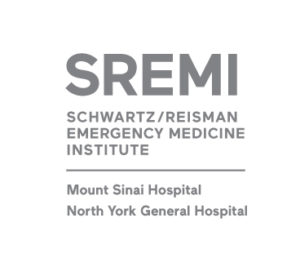Grant Competition Information
Available Grants 2023-24
CAEP-SREMI Grants (2 x $5,000)
CAEP continues its partnership with the Schwartz/Reisman Emergency Medicine Institute (SREMI) to support two $5,000 grants for the 2022 CAEP Grant Competition.
The grants are open to junior investigators (< 5 years post-EM-residency) and will be used to foster Canadian emergency medicine research, specifically:
- 1 grant will be awarded to a research project pertaining to the evaluation of an innovative educational program of relevance to emergency medicine
- 1 grant for research that is aligned with the SREMI Pillars of Inquiry (geriatrics and the ageing population; alcohol and substance use disorders; mental health, including youth mental health; shared decision-making; transitions of care; women’s health; and emergency care equity).
Unsuccessful CAEP-SREMI grant applicants will still be considered for one of the junior investigator grants.
CAEP-CanVECTOR Grant (1 x $5,000)
An ongoing partnership between CAEP and the Canadian Venous Thromboembolism Research Network (CanVECTOR) will support one $5,000 grant for the 2022 CAEP Grant Competition.
The CAEP-CanVECTOR Grant is open to junior investigators (< 5 years post-EM-residency) for a research project that aims to reduce venous thromboembolism (VTE) occurrence, improve VTE diagnosis and therapeutic management, improve the safety of anticoagulant delivery, or enhance the quality of life of those impacted by VTE in the emergency care setting.
Unsuccessful CAEP-CanVECTOR grant applicants will still be considered for one of the junior investigator grants.
Junior Investigator Grants (4 x $5,000)
QIPS Grants (2 x $2,500)
This category is open to EM fellows, graduate students, staff physicians, faculty, etc (i.e., not limited to junior investigators). These grants are to support initiatives targeted at improving any of the dimensions of healthcare quality (i.e. safety, timeliness, efficiency, equitability, effectiveness or patient-centeredness), on a local or broader level. Projects submitted for the QIPS Grant Competition must utilize QI methodology (e.g., Model for Improvement, Plan-Do-Study-Act cycles, rapid iterative improvements). Projects that involve the study of the effectiveness of a single intervention or studies on the topic of quality/safety utilizing clinical epidemiology or research methods will not be considered for the QIPS Grant Competition. Additional information is available in the “QIPS Grants” tab below.
EMAF Grants (1 x $10,000) + Grizzly Den (1 x $10,000)

Junior Investigator (including CAEP-SREMI and CAEP-CanVECTOR) Grants - Criteria, Submission, Verification & Scoring
Applicant Criteria
- The principal investigator (PI) and co-investigator must both be current CAEP members at the time of application.
- The application requires the submission of the CV of the PI and co-PI.
- Junior investigators should be mentored by an experienced researcher, who must be identified as the co-PI.
- The PI must be either:
- An emergency physician less than five years beyond the date of completion of residency training; or,
- A trainee in one of the following:
- A Canadian EM residency program
- A PhD or post-doctoral trainee in Canada with EM-focused research
- A trainee within a Canadian EM post-residency subspecialty fellowship program.
- PI/Co-PI’s are responsible for all aspects of the project and grant, including coordinating financial and administrative aspects, as well as leading the intellectual direction of the proposed activities.
- Either the PI or the Co-PI must satisfy all of the following:
- Be eligible to hold research funds at their institution; and,
- Be eligible to apply to their local research ethics board as a PI;
- Be a clinician working within the field of emergency medicine or a non-clinician researcher whose focus is emergency medicine
*List of qualifying fellowships (EM subspecialty areas): Any fellowship training outside of this list requires special mention and justification for consideration in the required letter of support from the fellowship director.
| Clinical Emergency Medicine Education Emergency Medical Services/Transport Medicine Ethics Global/International Health |
Health Administration Palliative Care Pediatric Emergency Medicine Research |
Sports Medicine Toxicology Trauma Ultrasound |
The submission process includes the following sections:
- Title
- Structured Abstract (<300 words)
- Headings must include:
- Introduction and Rationale
- Research Question (Preferably in PICO format)
- Methods
- Impact
- Headings must include:
- Research Protocol (<2000 words, excluding references)
- Headings must include:
- Introduction & Rationale
- Research Question (Preferably in PICO format)
- Methods (including Study Design, Setting, Selection of Participants, Outcome Measures, Statistical Analyses, Sample Size Calculation)
- Preliminary results (if applicable)
- *References should be included in the Appendix
- Headings must include:
- Tables and Graphs
- Conflicts of Interest
- Timeline
- Impact of the proposed study (<300 words)
- Knowledge Translation (<300 words)
- Budget & Justification
- Investigator Team: List all applicants, describing their role and time commitment on the project, starting with the PI and co-PI (if applicable).
- Appendix (including protocol references)
- For CAEP-SREMI grants, please describe how this study aligns with the research interests of SREMI (geriatric emergency medicine, substance use and mental health, early pregnancy complications, ED triage and flow, and cancer care in the ED).
—–
Submission Limit: There is no limit for the number of unique grant proposals that a person may submit. Note that if one proposal is submitted to multiple categories (Junior Investigator, EMAF, and QIPS), it will only be considered for the lower-valued grant category. Unsuccessful CAEP-SREMI and CAEP-CanVECTOR grant applicants will still be considered for one of the junior investigator grants.
Applicant Verification
- Relevant start and stop dates (i.e., undergraduate MD, residency, fellowship) must be included in the application.
- Applicants can specify parental or sick leaves that may extend their eligibility or alter their anticipated start and stop dates.
- Applicants who misrepresent their eligibility or whose membership type is not accurate, will be disqualified.
Letters of Support
- Each application should have two letters of support. Each letter should come from someone outside of the research team (with the exception of trainees whose program director is part of the research team).
- If the applicant is a trainee, a letter of support is required from the PI’s supervisor (e.g. director of the residency program, director of the fellowship program etc.) confirming training status, and training start and stop dates.
- If the applicant is a post-core residency fellow, area of fellowship training must be mentioned in the letter of support from the fellowship director. Any fellowship training outside of the list* requires special mention and justification for consideration in the required letter of support from the fellowship director.
- Other letters of support are up to the discretion of the applicant. For non-trainees a letter of support from the applicants clinical and/or academic department head is suggested
Review & Scoring Process
- Applications are not blinded for the reviewer.
- Each grant proposal is assigned to three reviewers (outside of their university or hospital).
- Assigned reviewers can declare a conflict of interest to have the proposal re-assigned.
- Proposals submitted to multiple categories (Junior Investigator, EMAF, and QIPS), will only be considered for the lower-valued grant category. Unsuccessful CAEP-SREMI and CAEP-CanVECTOR grant applicants will still be considered for one of the junior investigator grants.
- The reviewers are given approximately 2 weeks to review all their assigned proposal using standardized method-specific review criteria.
- Once all reviews are submitted, the scores are downloaded from the grant submission site and ranked. The mean score from the three reviews is used.
- The top proposals by rank are further reviewed by the Research Committee Chair and the Grant Competition Lead(s).
- CAEP reserves the right to limit the number of grants offered in a given category if too few applications meet a minimal quality standard (to be determined by consensus annually).
- Notifications will be emailed to the PI by April 21, 2023.
- Relevance to emergency medicine
- Methodological quality
- Originality of the topic and methodology
- Level of training and strength of the team
- Ability to complete the proposed study
EMAF Grants - Criteria, Submission, Verification & Scoring
Applicant Criteria
- The principal investigator (PI) must be a current CAEP member at the time of application.
- The application requires the submission of the CV of the PI and co-PI (if applicable).
- Trainees are ineligible to be listed as the PI for the EMAF grant. The PI must be a clinician working within the field of emergency medicine or non-clinician researcher whose focus is emergency medicine.
- PI/Co-PI’s are responsible for all aspects of the project and grant, including coordinating financial and administrative aspects, as well as leading the intellectual direction of the proposed activities.
- Either the PI or the Co-PI must satisfy all of the following:
- Be eligible to hold research funds at their institution; and,
- Be eligible to apply to their local research ethics board as a PI;
- Be a clinician working within the field of emergency medicine or a non-clinician researcher whose focus is emergency medicine.
- Title
- Structured Abstract (<300 words)
- Headings must include:
- Introduction and Rationale
- Research Question (Preferably in PICO format)
- Methods
- Impact
- Headings must include:
- Research Protocol (<2000 words, excluding references)
- Headings must include:
- Introduction & Rationale
- Research Question (Preferably in PICO format)
- Methods (including Study Design, Setting, Selection of Participants, Outcome Measures, Statistical Analyses, Sample Size Calculation)
- Preliminary results (if applicable)
- *References should be included in the Appendix
- Headings must include:
- Tables and Graphs
- Conflicts of Interest
- Timeline
- Impact of the Proposed Study (<300 words)
- Knowledge Translation (<300 words)
- Budget & Justification
- Investigator Team: List all applicants, describing their role and time commitment on the project, starting with the PI and co-PI (if applicable).
- Appendix (including protocol references)
—–
Submission Limit: There is no limit for the number of unique grant proposals that a person may submit. Note that if one proposal is submitted to multiple categories (Junior Investigator, EMAF, and QIPS), it will only be considered for the lower-valued grant category.
Letters of Support
- Each application should have two letters of support.
- If the applicant is a trainee, a letter of support is required from the PI’s supervisor (e.g. director of the residency program, director of the fellowship program etc.) confirming training status, and training start and stop dates.
- If the applicant is a post-core residency fellow, area of fellowship training must be mentioned in the letter of support from the fellowship director. Any fellowship training outside of the list* requires special mention and justification for consideration in the required letter of support from the fellowship director.
- Relevant start and stop dates (i.e., undergraduate MD, residency, fellowship) must be included in the application.
- Applicants can specify parental or sick leaves that may extend their eligibility or alter their anticipated start and stop dates.
- Applicants who misrepresent their eligibility or whose membership type is not accurate, will be disqualified.
- Other letters of support are up to the discretion of the applicant. For non-trainees a letter of support from the applicants clinical and/or academic department head is suggested
Review & Scoring Process
- Applications are not blinded for the reviewer.
- Each grant proposal is assigned to three reviewers (outside of their university or hospital).
- Assigned reviewers can declare a conflict of interest to have the proposal re-assigned.
- Proposals submitted to multiple categories (Junior Investigator, EMAF, and QIPS), will only be considered for the lower-valued grant category.
- The reviewers are given approximately 2 weeks to review all their assigned proposal using standardized method-specific review criteria.
- Once all reviews are submitted, the scores are downloaded from the grant submission site and ranked. The mean score from the three reviews is used.
- All grants are reviewed further by the Research Committee Chair and the Grant Competition Lead.
- No more than one EMAF grant per year can be awarded to a PI belonging to the allied health category.
- The top three runners-up in the EMAF grant category will be invited to participate in the CAEP 2023 Grizzly Den competition in Toronto) where applicants compete for one of the EMAF grants (up to $10,000 in funding).
- CAEP reserves the right to limit the number of grants offered in a given category if too few applications meet a minimal quality standard (to be determined by consensus annually). If the runner-up declines, then the next ranked grant will be invited until three Grizzly Den presenters are confirmed.
- Notifications will be emailed to the PI by April 21, 2023. Those who qualify for the Grizzly Den will be notified separately.
- Relevance to emergency medicine
- Methodological quality
- Originality of the topic and methodology
- Level of training and strength of the team
- Ability to complete the proposed study
QIPS Grants - Criteria, Submission, Verification & Scoring
Applicant Criteria
- The principal investigator (PI) and Co-PI (if applicable) must both be current CAEP members at the time of application and when receiving grant funds.
- The application requires the submission of the CV of the PI and co-PI (if applicable).
- Trainees from the following programs are eligible to be named as the PI:
-
- A Canadian EM residency program
- A PhD or post-doctoral trainee with EM-focussed research
- A trainee within a Canadian EM post-residency subspecialty fellowship program.
- If the PI is a trainee, they should be mentored by an experienced researcher who should be identified as the co-PI
- PI/Co-PI’s are responsible for all aspects of the project and grant, including coordinating financial and administrative aspects, as well as leading the intellectual direction of the proposed activities.
- Either the PI or the Co-PI must satisfy all of the following:
1 – Be eligible to hold research funds at their institution; and,
2 – Be eligible to apply to their local research ethics board as a PI;
3 – Be a clinician working within the field of emergency medicine or a non-clinician researcher whose focus is emergency medicine
*List of qualifying fellowships (EM subspecialty areas): Any fellowship training outside of this list requires special mention and justification for consideration in the required letter of support from the fellowship director.
| Clinical Emergency Medicine Education Emergency Health Services/Transport Medicine Ethics Global/International Health |
Health Administration/Leadership Palliative Care Patient Safety Pediatric Emergency Medicine Public Health Quality Improvement |
Research Sports Medicine Toxicology Trauma Ultrasound |
Submission Instructions
- Projects submitted for the QIPS Grant Competition must utilize QI methodology. Projects that involve the study of the effectiveness of a single intervention or studies on the topic of quality/safety utilizing clinical epidemiology or research methods will not be considered.
- Projects must be based on a defined problem statement and have the primary purpose of improving the stated problem. They must include an improvement aim and show plans for an iterative approach (e.g., using Plan-Do-Study-Act cycles, and/or the Model for Improvement), for repeated data sampling and measurements, and for an evaluation consistent with QI principles (e.g., run or control charts).
- CAEP expects that authors follow any local guidelines for ethical review of QI projects, and that they seek Research Ethics Board (REB) approval or proof of exemption from their local institution’s REB Board.
- A letter from the project’s sponsor is required (more details below).
- For additional details on features of high-quality QI methodology, refer to the SQUIRE 2.0 Guidelines.
- Title: Enter the title in sentence case. Do not put the title in quotation marks.
- Structured abstract (<300 words):
- Headings must include:
- Background/Rationale
- Planned Methodology
- Expected Results
- Impact
- Headings must include:
- QIPS Research Protocol (<1200 words excluding references): Recommended subheadings (which mirror the evaluation matrix projects will be evaluated against) include:
- Problem and Background: What is the quality gap/problem that you are trying to improve, and how do you know that there is an issue at all (locally or generally)?
- Rationale/Importance and Benefits: Why is this an important problem to tackle (e.g., frequency & relevance to emergency medicine), and what are the expected benefits for patients and/or providers?
- Aim Statement: What is the aim of this project? (E.g., what are you trying to achieve, by how much, and by when?)
- REB, Scope and Infrastructure/Support/Context: What are the things (people, tasks, processes) that this project will and will not touch on, how feasible is it within the local context, and is Research Ethics Board (REB) approval/exemption necessary?
- Measures & Evaluation Plan: What is/are the measure(s) that you will track, and what is your data/evaluation plan?
- QI Methods and/or Change Ideas Planned: Which QI methods have you/will you utilize in this project, and what are your potential change theory/ideas (if already known)?
- Project Leader, Sponsor, and Stakeholders: Who are the team leader(s), sponsor(s) and members, what will be their respective responsibilities and how well-prepared are they for success? How will stakeholders, including front-line healthcare providers and patients/families, be engaged in the development of tests of change and evaluation of impact?
- Resources: What resources will you require – human, equipment, authorizations and permissions, etc.?
- Tables and figures: Upload as attachments with specific labels for cross-referencing.
- Conflicts of Interest
- Timeline
- Impact of the Proposed Study (<300 words)
- Knowledge Translation (<300 words)
- Budget and Justification
- Investigative Team: List all applicants, describing their role and time commitment on the project, starting with the PI and co-PI (if applicable).
- Appendix (including references)
- CV of the primary investigator
—–
Submission Limit: There is no limit for the number of unique grant proposals that a person may submit. Note that if one proposal is submitted to multiple categories (Junior Investigator, EMAF, and QIPS), it will only be considered for the lower-valued grant category.
Letters of Support
- Each application should have two letters of support.
- In order to be successful, QI projects often necessitate the contribution of many stakeholders and champions, and the support (financial, clout or otherwise) of an executive sponsor that can open doors and ensure buy-in. As such, QIPS Grants require a letter of support of the project’s executive sponsor. Depending on the specific project, this person could be the Department/Division Chair/Chief, a relevant nursing manager, or a hospital Vice-President. This letter should comment on whether you have sufficient training, infrastructure, support, time and resources to conduct the project.
- If the PI is a practicing clinician or non-clinician scientist, a letter of support is required from the department director of the ED or the EM academic lead for the university (chair, division director, chief) verifying that the PI has sufficient training, infrastructure, time and resources to complete the project.
- If the PI is a trainee, a letter of support is required from the PI’s supervisor (e.g. director of the residency program, director of the fellowship program, etc.) confirming training status, and training start and stop dates.
- For clinical fellows, area of fellowship training must be mentioned in the letter of support from the fellowship director. Any fellowship training outside of the list requires special mention and justification for consideration in the required letter of support from the fellowship director.
Review & Scoring Process
- Applications are not blinded for the reviewer.
- Each grant proposal is assigned to three reviewers (outside of their university or hospital).
- Assigned reviewers can declare a conflict of interest to have the proposal re-assigned.
- Proposals submitted to multiple categories (Junior Investigator, EMAF, and QIPS), will only be considered for the lower-valued grant category.
- The reviewers are given approximately 2 weeks to review all their assigned proposal using standardized method-specific review criteria.
- In their evaluation of the QIPS Grants, the reviewers will consider all documents submitted, with an explicit emphasis on the items listed in the “QIPS project in depth” section.
- Once all of the reviews are submitted, the scores are ranked using the average score from the three reviews.
- The top proposals by rank are further reviewed by the Research Committee Chair and the two other committee members to ensure that the applicants are appropriately qualified.
- CAEP reserves the right to limit the number of grants offered in a given category if too few applications meet a minimal quality standard (to be determined by consensus annually).
- Notifications will be emailed to the PI by April 21, 2023.
- Problem and background
- Rationale/importance and benefits
- Aim statement
- REB, scope and infrastructure/support/context
- Measures & evaluation plan
- QI methods and/or change ideas planned
- Milestones and timelines
- Project leader & sponsor, and stakeholders
- Resources/budget
- Overall impression and impact
Funding Provisions/Admissible Expenses and Use of Funds
Funding Provisions
- A Principal Investigator (PI) can only hold one CAEP grant of any kind at a time, and will become eligible to reapply once End-of-Project Reporting is reviewed and approved by CAEP. There is no limit to the number of CAEP grants that can be held by co-investigators.
- A PI submitting more than one grant application (each year) whose multiple projects are eligible for funding at the $5,000 and $10,000 level will be asked to accept only one of their choosing.
- CAEP grant money must be received and held by the institution of the PI or co-PI and will not be paid to investigators directly.
- CAEP grant recipients are expected to maintain their CAEP membership for the duration of their grant. Failure to do so will result in CAEP recalling the funding for the grant and prohibiting them from receiving future funding.
Admissible Expenses and Use of Funds
- CAEP financial support cannot be combined with other funding sources (salary funding excluded). The grant proposal must represent a project that is completely independent of any other already funded project (i.e., CAEP grant costs cannot be covered by any another existing grant).
- The project must be completed within the term of the grant award (within two years). No-cost extensions may be requested from CAEP if unanticipated delays are encountered.
- Funding cannot be used for meeting registration, travel, publication cost, equipment purchases, software, or payments to members of the investigator team.
- Funds cannot be used to cover any expenses incurred prior to receiving notification of the award.
- Funds must only be used for expenses included in their original budget. If the PI/co-PI would like to use funds for additional expenses, they must submit a written request to CAEP to seek advance approval.
- CAEP reserves the right to request reimbursement of funds for expenses which were not approved in advance or for expenses that are inadmissible.
- If funds have been used for expenses that are inadmissible or were not approved in advance, the PI will be prohibited from receiving future for CAEP grant funding
End-of-Project Reporting to CAEP
- The PI must provide a final report to CAEP within 14 days of the end of the grant term. If the final project report is not submitted, CAEP may recall the funding of the grant.
- The PI will be prohibited from receiving future CAEP grant funding until the end-of-project report is received by CAEP.
- Budget reconciliation:
- The following information must be included for each item: budget item name, budgeted amount, actual amount, and deficit/surplus amount.
- The report must include the overall budget total and a note if any of the original expense categories were changed (with prior approval from CAEP).
- Receipts must be included for every budget line item.
- Any unused funds must be returned to CAEP
- A project extension of up to 12 months may be granted. Extensions must be requested in writing at least 14 days prior to the end of the grant term. If an extension is granted, submission of the end of project report is delayed until 14 days after the updated project completion date.
Questions? Contact Jennifer Gale (jgale@caep.ca)


